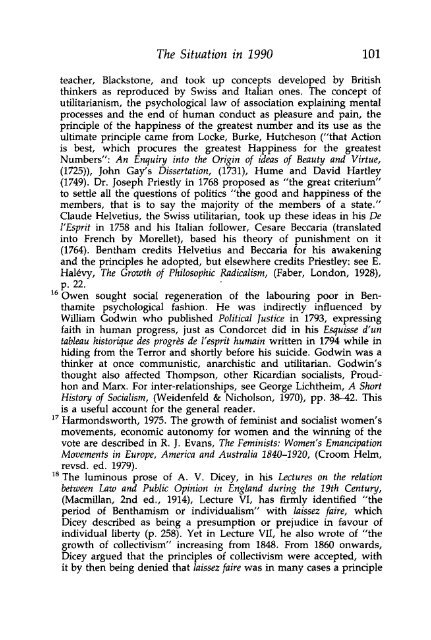The United Kingdom and Human Rights - College of Social ...
The United Kingdom and Human Rights - College of Social ...
The United Kingdom and Human Rights - College of Social ...
You also want an ePaper? Increase the reach of your titles
YUMPU automatically turns print PDFs into web optimized ePapers that Google loves.
<strong>The</strong> Situation in 1990 101<br />
teacher, Blackstone, <strong>and</strong> took up concepts developed by British<br />
thinkers as reproduced by Swiss <strong>and</strong> Italian ones. <strong>The</strong> concept <strong>of</strong><br />
utilitarianism, the psychological law <strong>of</strong> association explaining mental<br />
processes <strong>and</strong> the end <strong>of</strong> human conduct as pleasure <strong>and</strong> pain, the<br />
principle <strong>of</strong> the happiness <strong>of</strong> the greatest number <strong>and</strong> its use as the<br />
ultimate principle came from Locke, Burke, Hutcheson ("that Action<br />
is best, which procures the greatest Happiness for the greatest<br />
Numbers": An Enquiry into the Origin <strong>of</strong> ideas <strong>of</strong> Beauty <strong>and</strong> Virtue,<br />
(1725)), John Gay's Dissertation, (1731), Hume <strong>and</strong> David Hartley<br />
(1749). Dr. Joseph Priestly in 1768 proposed as "the great criterium"<br />
to settle all the questions <strong>of</strong> politics "the good <strong>and</strong> happiness <strong>of</strong> the<br />
members, that is to say the majority <strong>of</strong> the members <strong>of</strong> a state."<br />
Claude Helvetius, the Swiss utilitarian, took up these ideas in his De<br />
I'Esprit in 1758 <strong>and</strong> his Italian follower, Cesare Beccaria (translated<br />
into French by Morellet), based his theory <strong>of</strong> punishment on it<br />
(1764). Bentham credits Helvetius <strong>and</strong> Beccaria for his awakening<br />
<strong>and</strong> the principles he adopted, but elsewhere credits Priestley: see E.<br />
Halevy, <strong>The</strong> Growth <strong>of</strong> Philosophic Radicalism, (Faber, London, 1928),<br />
p. 22.<br />
16 Owen sought social regeneration <strong>of</strong> the labouring poor in Benthamite<br />
psychological fashion. He was indirectly influenced by<br />
William Godwin who published Political Justice in 1793, expressing<br />
faith in human progress, just as Condorcet did in his Esquisse d'un<br />
tableau historique des progres de I 'esprit humain written in 1794 while in<br />
hiding from the Terror <strong>and</strong> shortly before his suicide. Godwin was a<br />
thinker at once communistic, anarchistic <strong>and</strong> utilitarian. Godwin's<br />
thought also affected Thompson, other Ricardian socialists, Proudhon<br />
<strong>and</strong> Marx. For inter-relationships, see George Lichtheim, A Short<br />
History <strong>of</strong> <strong>Social</strong>ism, (Weidenfeld & Nicholson, 1970), pp. 38-42. This<br />
is a useful account for the general reader.<br />
17 Harmondsworth, 1975. <strong>The</strong> growth <strong>of</strong> feminist <strong>and</strong> socialist women's<br />
movements, economic autonomy for women <strong>and</strong> the winning <strong>of</strong> the<br />
vote are described in R. J. Evans, <strong>The</strong> Feminists: Women's Emancipation<br />
Movements in Europe, America <strong>and</strong> Australia 1840-1920, (Croom Helm,<br />
revsd. ed. 1979).<br />
18 <strong>The</strong> luminous prose <strong>of</strong> A. V. Dicey, in his Lectures on the relation<br />
between Law <strong>and</strong> Public Opinion in Engl<strong>and</strong> during the 19th Century,<br />
(Macmillan, 2nd ed., 1914), Lecture VI, has firmly identified "the<br />
period <strong>of</strong> Benthamism or individualism" with laissez faire, which<br />
Dicey described as being a presumption or prejudice in favour <strong>of</strong><br />
individual liberty (p. 258). Yet in Lecture VII, he also wrote <strong>of</strong> "the<br />
growth <strong>of</strong> collectivism" increasing from 1848. From 1860 onwards,<br />
Dicey argued that the principles <strong>of</strong> collectivism were accepted, with<br />
it by then being denied that laissez faire was in many cases a principle

















